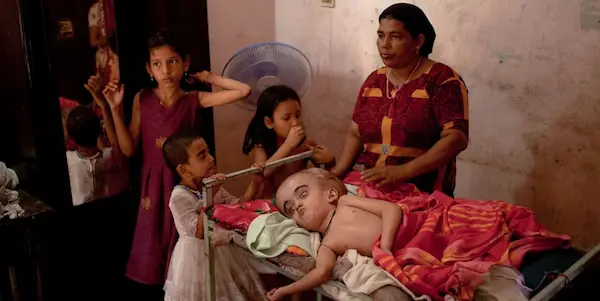It’s no secret that pesticides are slowly killing us. (And by “us,” I really mean the third-world countries where we export these chemicals.) Luckily, we have filmmakers like Evan Mascagni to tell the real story: the one where Indian children are dying of exposure to endosulfan, a pesticide used to spray cashew crops.
The “Circle Of Poison” represents the cycle of pesticides in developing countries as they make their way back to the US in the form of produce residue. In fact, only 2% of imported produce is inspected by the FDA, making it very easy for pesticides to slip past into our food supply.
Mascagni’s film, Circle of Poison, takes us around the globe to investigate the pesticide-related illnesses plaguing developing nations, especially as they affect the young and vulnerable, largely the sons and daughters of field workers.
The film also tells another story—that of the Big Six corporations like Bayer and Monsanto that export banned pesticides to countries where they can be legally used. And finally, the film offers solutions to the pesticide problem, largely through the organic farming movement.
I was lucky enough to meet Evan Mascagni at a screening of Circle of Poison in my hometown. A former lawyer, Evan developed a passion for justice in the food industry. He took to traveling around the world, filming interviews with big names like Noam Chomsky, Vandana Shiva, and the Dalai Lama himself.
I reached out to Evan, who graciously agreed to an interview. Below is our conversation via email.
Sophia Cowley for Film Inquiry: What drew you to this particular issue?
Evan Mascagni: Carolyn Strickler, one of my friends from college who is unfortunately no longer with us, was the first person who really got me thinking about our food system, and got me asking questions about it. Then in law school, I learned about the federal regulation that led to the circle of poison. However, it wasn’t until I was in Guatemala after law school that I actually saw the health and environmental harm that the global pesticide industry is causing. My trip inspired me to attempt to bring attention to this issue, so I teamed up with Nick and Shannon to make that happen.

How did you develop contacts in India and Mexico?
Evan Mascagni: We partnered with a lot of great organizations to help us out along the way. In Mexico, for example, we worked with the International Indian Treaty Council (IITC). Thanks to Executive Director of IITC, Andrea Carmen of the Yaqui Nation (who is interviewed in the film), we were able to film in the Yaqui Valley in Sonora, Mexico, to document the effects of pesticides on the community and the efforts of organic farmers who refuse to spray. IITC works for the rights and recognition of Indigenous Peoples.
IITC also helped us coordinate screenings at both the United Nations and in Geneva at the Stockholm Convention on Persistent Organic Pollutants (Pesticide/Chemical) Convention. IITC showed the film in their side-event in Geneva. We received this note from IITC after the screening:
“Our side-event was a hit with standing room only! Here we are negotiating 3 harmful chemicals for global ban and your film brought reality and emotion into this arena, which is otherwise severely lacking. We even had 2 members of the US delegation from the EPA and the State Dept attend the event. I am certain this helped our advocacy here. Thank you for all you do!”
What, if any, new legislation has come about since the film’s release?
Evan Mascagni: In one of his first acts as the head of the Environmental Protection Agency, Scott Pruitt rejected a petition filed ten years ago to ban all uses of the toxic pesticide chlorpyrifos. Under the Obama administration, EPA scientists had concluded that exposure to chlorpyrifos could potentially have significant health consequences and concluded that the chemical should be banned.
Speaking to the New York Times about Pruitt’s decision, the former head of the EPA chemical safety unit stated: “They are ignoring the science that is pretty solid.” He added “that he believed the ruling would put farm workers and exposed children at unnecessary risk.”
What can we do to fight the war against pesticides? How can we spread the word about chemicals like glyphosphate, which winds up in products like Cheerio’s? What can we do to protect future generations from these dangerous substances?
Evan Mascagni: One thing I hope is that that viewers don’t walk away from our film only thinking about their own health and saying things like, “I’m only going to eat organic from now on.” Not that eating organic when possible is not important, but our goal was to show how toxic pesticides affect so much beyond the end consumer. We also hope that our film inspires people to start asking questions about pesticides and other products made for export only.
I understand that you are working on a new project now! Can you tell us a little about it?
Evan Mascagni: Yes! Very excited about a new project I’m working on called Reclaiming Appalachia, a feature length documentary film about the people and projects turning coal country into America’s most sustainable region. I’m originally from Kentucky and have long wanted to do a film highlighting the important work people in my home state are working on, which includes converting reclaimed mined mountains into solar farms and sustainable agriculture projects.
Thank you to Evan for the interview! Circle of Poison is available for rent or purchase on iTunes, Amazon, Google Play, and Vudu. To find out more visit: www.circleofpoison.com.
What did you think of Circle of Poison? Do films like this one inspire you to take action?
Does content like this matter to you?
Become a Member and support film journalism. Unlock access to all of Film Inquiry`s great articles. Join a community of like-minded readers who are passionate about cinema - get access to our private members Network, give back to independent filmmakers, and more.